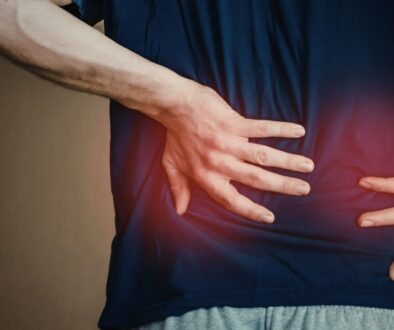Can IBS Lead To Back Pain?

Published June 21, 2021
Although abdominal pain is a common symptom of irritable bowel syndrome (IBS), the relationship between ordinary back pain and IBS is less clear. Since IBS has several symptoms that are close to those of other illnesses, it may be difficult to diagnose. This is why physicians are available to assist us in better understanding our health and wellbeing.
So how do we know if the back pain we’re experiencing is already unusual? Make sure you are prepared to take notes! With this article, we will help you manage and understand IBS back pain, the treatments required, and how you can live with it comfortably.
Introduction to IBS
Irritable bowel syndrome (IBS) is classified as a chronic gastrointestinal disorder. It is a condition you’ll have to endure for a long time. IBS symptoms include:
- Cramping
- Stomach pain
- Bloating
- Gas
- Diarrhea or constipation, or sometimes both
There are two forms of this functional disease—IBS-D and IBS-C. IBS with diarrhea (IBS-D) is defined as chronic or persistent diarrhea, whereas IBS with constipation (IBS-C) is defined as abdominal pain or discomfort due to constipation. Moreover, some people suffer diarrhea and constipation at the same time.
Possible Causes of IBS
When your abdomen stretches from gas or stool, abnormalities in your gastrointestinal nervous system can play a role in causing you to feel more uncomfortable than usual.
On the other hand, irritable bowel syndrome is also a condition where there is no apparent cause. There are, however, some possible causes that can set off an attack, such as:
- Dysmotility – Issues with how your gastrointestinal muscles contract and transfer food into your digestive tract.
- Visceral hypersensitivity – Nerves in the gastrointestinal tract that are extremely sensitive.
- Brain-gut dysfunction – Nerves in the brain and gut miscommunication.
- Food intolerance – Sugars, especially lactose, are the most common dietary triggers for IBS. Fructose and sorbitol are also known to cause IBS.
- Medications – Antibiotics, antacids, and pain relievers, for example, can cause constipation or diarrhea.
Does IBS Cause Back Pain?
Many people with IBS experience lower back pain in addition to abdominal pain. This discomfort can be caused by constipation or gas, both of which are symptoms of IBS. In addition, they may also experience sleep disturbances, muscle pain, fatigue, and urination problems.
Fecal impaction—a large, dry stool trapped in the colon or rectum—can cause back pain as well. Due to the dry stool being trapped, it pressures the rectum or colon, which causes pain in the back or abdomen. According to studies, this condition affects between 28 and 81 percent of people.
Moreover, people who suffer from IBS and experiencing back pains at the same time may also have other health issues. These include:
- Interstitial cystitis – a long-term condition that causes bladder pressure, discomfort, and sometimes even pelvic pain
- Fibromyalgia – a condition marked by widespread musculoskeletal discomfort, as well as exhaustion, sleep, and mood swings
It can also be linked to other inflammatory disorders, such as rheumatoid arthritis, resulting in back pain. When these symptoms appear, you must call your doctor as you may need medical attention fast.
IBS is diagnosed based on the duration and frequency of signs and symptoms. To give you an estimate, waiting for a diagnosis of IBS can take up to six months, while signs and symptoms can take up to three months. In addition, a new blood test may aid in the diagnosis of certain types of IBS.
IBS Treatments
Medical professionals can treat IBS. However, treatments vary from person to person. To find the best treatment for IBS, you and your doctor will need to collaborate. Moreover, if your problems are moderate to severe, your doctor may advise you to seek counseling, particularly if you suffer from depression or if stress exacerbates your symptoms. Below are the treatments that are often used.
Dietary Modifications
Your doctor may advise you to remove certain foods from your diet. Such as high-gas food, gluten, and FODMAPs. Your doctor may also recommend that you modify your fiber intake or keep a food log to help you identify the foods that are causing your symptoms.
Techniques to Relieve Stress
There are techniques or practices you can stick to when relieving your stress. However, experts recommend trying out a few other techniques to see which one fits you well before committing to one. For example, you can try working out for at least 20 minutes a day, but even a few minutes can be beneficial. Techniques like guided imagery, mindfulness meditation, body scan, focused breathing, and repetitive prayer can help improve your condition over time.
Therapeutic Intervention
The ultimate goal of therapeutic intervention is to change how the patient feels, thinks, and acts. The main focus of this treatment is to change self-destructive behavior and consider psychological factors. This treatment is particularly beneficial when coping with IBS or back pain.
Prescribed IBS Medications
Depending on the severity of your symptoms, pharmacological therapy (drugs) may be beneficial. Some patients with irritable bowel syndrome may benefit from antidepressants, while others may benefit from anti-diarrheal medications such as loperamide.
Alternative Health Practices
IBS patients may benefit from alternative treatments, and these approaches have been medically reviewed. Progressive stimulation is used in IBS hypnotherapy, along with calming visuals and stimuli tailored to the individual’s symptoms.
Remember that self-diagnosis isn’t accurate, and always seek clinical support from trained practitioners. If you self-diagnose, your condition may only worsen.
Living With IBS and Back Pain
You likely blame your sleeping position every time you wake up with back pain. Your spine becomes strained, flattening its natural curve as a result of poor sleeping positions. However, what if IBS is to blame for your back pain? According to research, 40% of people with Irritable Bowel Syndrome (IBS) have sleep issues.
To help you live a normal life, below are quick tips to improve your sleep despite having back pain and irritable bowel:
- Avoid using mobile devices or watching TV before going to bed
- Make sure you practice relaxation techniques before bedtime and do not stress about anything
- Exercise for at least 20 minutes before going to bed can exhaust your body, which will help you sleep faster and better
- Avoid consuming food or caffeine before bedtime
- Practice a sleeping and waking-up routine

If you are experiencing IBS back pain simultaneously, don’t automatically think that everything is okay because they are related. The first thing you should do is make a doctor’s appointment so he/she can provide medical advice, diagnosis, or treatment. It’s crucial to know exactly what you’re dealing with and what treatments are available. Remember that “health is wealth,” so always put your health above anything else.
Benefit From The Latest Advancements In Probiotic Science With Bionaze
Bionaze is a proprietary blend of probiotics proven to promote ear, nose, and throat health, improve digestion, and support your immune system. The active ingredients BLIS K12, and BL-04 are considered among the best probiotics according to science.
Get 25% Off Your First Order when you use BIO25 at checkout!

This Content Has Been Reviewed For Factual Accuracy
This content has undergone thorough fact-checking by our team of internal experts. Learn more about the meticulous editorial standard for our website here.
ADVERTISEMENT

About The Author
Krizzia Paolyn has a bachelor’s degree in Psychology. She started her career as a content writer for various digital magazines and renowned publications. It has always been her passion to share her voice, and at the same time, to encourage other people to speak up.




